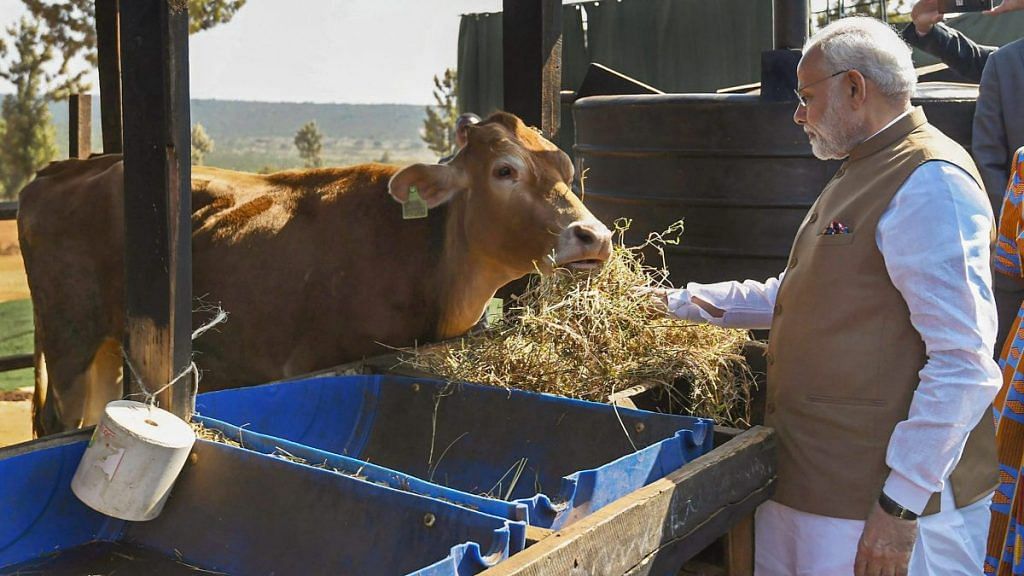Indian bikes on China-made roads can help us understand the Indo-China equation in Rwanda.
Narendra Modi was India’s first Prime Minister to visit Rwanda. He landed just after Xi Jinping became China’s first President to visit the east African country. It was not mere coincidence.
While several analysts often restrict the Indo-China battle for influence in the south Asian region and to the ‘string of pearls’, the two countries compete with each other in several ways beyond Asia. An interesting example of this can be seen in east Africa, where both nations are gaining ground in different ways.
Rwanda is among Africa’s fastest growing economies, a spectacular comeback after the genocide of the Tutsis, which eliminated not just 10 per cent of their population but also its intelligentsia- only two decades ago. Rwandese President Paul Kagame is currently the chairperson of the African Union and the strategic location of the country makes it all the more relevant in the continent. There is an increasing realisation in both India and China, and rightly so, that they cannot assess their global standing only on the basis of their Euro-American relations.
China’s hard power is on mighty display in the capital city of Kigali, where a Chinese company is helping the city bridge its looming housing deficit by building the country’s largest real estate project aptly named the “Vision City”. It is not just housing and real estate, China has helped the country make 70 per cent of its roads, has substantial investments in their manufacturing sector across the spectrum, and is also working at strengthening rail connectivity in the region.
These efforts cannot merely be viewed in the context of China’s ambitious ‘Belt and Road Initiative’. China was the first country to open its mission in Kigali after the genocide and has been investing in the country ever since. Like in Pakistan, these interventions have come with Mandarin classes to bridge the cultural divide.
In contrast, Modi’s move to gift 200 cows under the Girinka Programme in the Rweru Model village makes the comparison look amusing and one-sided. But there is more than what meets the eye. Not only does this move strike a cord with the local custom of gifting cows, it adds to India’s inherent strength in international relations that is its soft power.
Motorbikes imported from India are among Rwanda’s most popular form of public transport. They will take you to the airport, to the lanes and bylanes, not only in Kigali but also in far-flung districts like genocide-hit Kirehe. These bikes are popular by the name “Motos” and are able to ply on the kutcha (mud) roads in rural Rwanda, where connectivity can become challenging- especially during the rains.
Many educated teenagers in Rwanda look upon India as an affordable destination for higher education. They are aware that several heads of states in Africa have studied in India, including a former Prime Minister of neighbouring Tanzania. The key to understanding Africa lies in the maps one will see in public places there, which are often of the African continent and hardly of just any one country. This is why the discrimination meted out towards any one country’s residents in India quickly become national headlines in all the countries.
Rwandese relate to Bollywood movies and songs and have their own favourites. On seeing a brown (Indian) person, several children in rural Rwanda can gather to perform the “chicken dance” from the ‘Kuk-doo-Koo‘ song in Bajrangi Bhaijaan.
On the culinary plane, both Indian and Chinese cuisines are gaining ground in the country. Overall, while China’s approach in building influence seems systematic and government-driven, it is only now that India has announced that it will open a mission in Rwanda. If India aspires to be a power of eminence, it cannot leave everything to be done by its diaspora, or as PM Modi called them in Kigali, our “rashtradoots”. The rajdoots will also have to be brought into the picture. India should assess its inherent strengths and build upon that advantage in planning out its trade policies and people-to-people contact. In a nutshell, Indian bikes on China-made roads can help us understand the Indo-China equation in Rwanda.
The author has worked in rural Rwanda and attended the “Experiencing China” course at Tsinghua University, Beijing. He is a law graduate from Oxford University and can be contacted at abhijaynegi93@gmail.com
